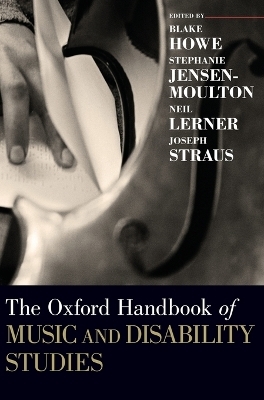
The Oxford Handbook of Music and Disability Studies
Oxford University Press Inc (Verlag)
978-0-19-933144-4 (ISBN)
The newly emerged interdisciplinary field of Disability Studies offers a sociopolitical analysis of disability, focusing on its social construction, and shifting attention from biology to culture. In the past fifteen years, disability-related scholarly work has been undertaken in a variety of disciplines, and disability now occupies a central place in cultural analysis, along with well-established categories like race/ethnicity, gender, sexuality, and class.
The Oxford Handbook of Disability Studies represents a comprehensive "state of current research" for the field of Disability Studies and Music. The forty-two chapters in the book span a wide chronological and geographical range, from the biblical, the medieval, and the Elizabethan, through the canonical classics of the eighteenth and nineteenth centuries, up to modernist styles and contemporary musical theater and popular genres, with stops along the way in post-Civil War America, Ghana and the South Pacific, and many other interesting times and places. Disability is a broad, heterogeneous, and porous identity, and that diversity is reflected in the variety of bodily conditions under discussion here, including autism and intellectual disability, deafness, blindness, and mobility impairment often coupled with bodily deformity. Cultural Disability Studies has, from its inception, been oriented toward physical and sensory disabilities, and has generally been less effective in dealing with cognitive and intellectual impairments and with the sorts of emotions and behaviors that in our era are often medicalized as "mental illness." In that context, it is notable that so many of these essays are centrally concerned with madness, that broad and ever-shifting cultural category. There is also in impressive diversity of subject matter including YouTube videos, Ghanaian drumming, Cirque du Soleil, piano competitions, castrati, medieval smoking songs, and popular musicals.
Amid this diversity of time, place, style, medium, and topic, the chapters share two core commitments. First, they are united in their theoretical and methodological connection to Disability Studies, especially its central idea that disability is a social and cultural construction. Disability both shapes and is shaped by culture, including musical culture. Second, these essays individually and collectively make the case that disability is not something at the periphery of culture and music, but something central to our art and to our humanity.
Blake Howe is Assistant Professor of Musicology at Louisiana State University. Stephanie Jensen-Moulton is Assistant Professor of Musicology at Brooklyn College, City University of New York. Neil Lerner is Professor of Music and Co-Coordinator of the Interdisciplinary Minor in Film & Media Studies at Davidson College. Joseph Straus is Distinguished Professor of Music at the Graduate Center of the City University of New York.
Introduction: Disability Studies in Music; Music in Disability Studies ; Blake Howe, Stephanie Jensen-Moulton, Neil Lerner, Joseph Straus ; Part 1. Disability Communities ; 1. Toward an Ethnographic Model of Disability in the Ethnomusicology of Autism ; Michael B. Bakan ; 2. Music, Intellectual Disability, and Human Flourishing ; Licia Carlson ; 3. Imagined Hearing: Music-Making in Deaf Culture ; Jeannette DiBernardo Jones ; 4. Musical Expression among Deaf and Hearing Song Signers ; Anabel Maler ; 5. The Politics of Sound: Music and Blindness in France, 1750-1830 ; Ingrid Sykes ; 6. "They Say We Exchanged Our Eyes for the Xylophone": Resisting Tropes of Disability as Spiritual Deviance in Birifor Music ; Brian Hogan ; 7. Understanding is Seeing: Music Analysis and Blindness ; Shersten Johnson ; Part 2. Performing Disability ; 8. Mechanized Bodies: Technology and Supplements in Bjork's Electronica ; Jennifer Iverson ; 9. Subhuman or Superhuman? (Musical) Assistive Technology, Performance Enhancement, and the Aesthetic/Moral Debate ; Laurie Stras ; 10. Disabling Music Performance ; Blake Howe ; 11. Music and Bodily Difference in Cirque du Soleil ; Stephanie Jensen-Moulton ; 12. Punk Rock and Disability: Cripping Subculture ; George McKay ; 13. Moving Experiences: Blindness and the Performing Self in Imre Ungar's Chopin ; Stefan Sunandan Honisch ; 14. Stevie Wonder's Tactile Keyboard Mediation, Black Key Compositional Development, and the Quest for Creative Autonomy ; Will Fulton ; 15. Oh, the Stories We Tell! Performer-Audience-Disability ; Michael Beckerman ; 16. The Dancing Ground: Embodied Knowledge, Disability, and Visibility in New Orleans Second Lines ; Daniella Santoro ; Part 3. Race, Gender, Sexuality ; 17. A Cannon-Shaped Man with an Amphibian Voice: Castrato and Disability in Eighteenth-Century France ; Hedy Law ; 18. Sexuality, Trauma, and Dissociated Expression ; Fred Everett Maus ; 19. That "Weird and Wonderful Posture": Jump "Jim Crow" and the Performance of Disability ; Sean Murray ; 20. Disabled Moves: Multi-dimensional Music Listening, Disturbing/Activating Differences of Identity ; Marianne Kielian-Gilbert ; Part 4. War and Trauma ; 21. Disabled Union Veterans and the Performance of Martial Begging ; Michael Accinno ; 22. "Goodbye, Old Arm": The Domestication of Veterans' Disabilities in Civil War-Era Popular Songs ; Devin Burke ; 23. "The Absurd Disordering of Notes": Dysfunctional Memory in the Post-Traumatic Music of Ivor Gurney ; Beth Keyes ; 24. Vocal Ability and Musical Performances of Nuclear Damages in the Marshall Islands ; Jessica Schwartz ; Part 5. Premodern Conceptions ; 25. Lyrical Humor(s) in the 'Fumeur' Songs ; Julie Singer ; 26. Difference, Disability, and Composition in the Late Middle Ages: ; Of Antonio "Zachara" da Teramo and Francesco "Il Cieco" da Firenze ; Michael Scott Cuthbert ; 27. Madness and Music as (Dis)ability in Early Modern England ; Samantha Bassler ; 28. Saul, David, and Music's Ideal Body ; Blake Howe ; Part 6. The Classical Tradition ; 29. Narratives of Affliction and Recovery in Haydn ; Floyd Grave ; 30. Music and the Labyrinth of Melancholy ; Elaine Sisman ; 31. Musical Prosthesis: Form, Expression, and Narrative Structure in Beethoven's Sonata Movements ; Bruce Quaglia ; 32. Sounds of Mind: Musicians and Madness in the Popular Imagination ; James Deaville ; Part 7. Modernism and After ; 33. Modernist Opera's Stigmatized Subjects ; Sherry Lee ; 34. Autism and Postwar Serialism as Neurodiverse Forms of Cultural Modernism ; Joseph Straus ; 35. Broken Facture: Representations of Disability in the Music of Allan Pettersson ; Allen Gimbel ; 36. Musical Modernism's Aesthetics of Disability ; Joseph Straus ; 37. "Defamiliarizing the Familiar": Michael Nyman, Narrative Medicine, and the Composition of Mental Blindness ; Stephanie Jensen-Moulton ; Part 8. Film and Musical Theater ; 38. Scene in a New Light: Monstrous Mothers, Disabled Daughters, and the Performance of Feminism and Disability in The Light in the Piazza (2005) and Next to Normal (2008) ; Ann M. Fox ; 39. "Pitiful Creature of Darkness": The Subhuman and the Superhuman in The Phantom of the Opera ; Jessica Sternfeld ; 40. "Waitin' for the Light to Shine": Musicals and Disability ; Raymond Knapp ; 41. Music for Richard III: Cinematic Scoring for the Early Modern Monstrous ; Kendra Preston Leonard ; 42. Hearing a Site of Masculinity in Franz Waxman's Score for Pride of the Marines (1945) ; Neil Lerner
| Erscheint lt. Verlag | 14.1.2016 |
|---|---|
| Reihe/Serie | Oxford Handbooks |
| Verlagsort | New York |
| Sprache | englisch |
| Maße | 249 x 173 mm |
| Gewicht | 1724 g |
| Themenwelt | Kunst / Musik / Theater ► Musik ► Musiktheorie / Musiklehre |
| Sozialwissenschaften ► Soziologie | |
| ISBN-10 | 0-19-933144-8 / 0199331448 |
| ISBN-13 | 978-0-19-933144-4 / 9780199331444 |
| Zustand | Neuware |
| Haben Sie eine Frage zum Produkt? |
aus dem Bereich


